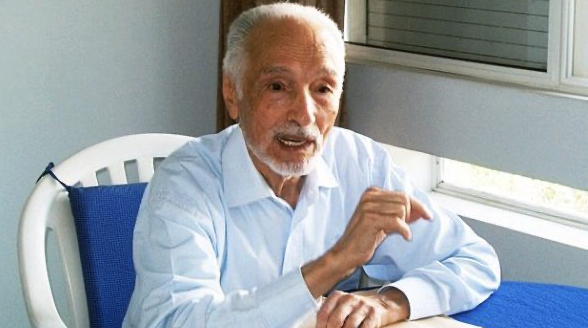The Spritual Leader Of The Amazigh movement
Mohamed Chafik is widely revered as a spiritual father among the Moroccan Amazighs. As a prominent Amazigh writer, researcher, historian, activist, and intellectual, he played a vital role in the founding of the Amazigh cultural movement. Chafik chose to champion Amazigh identity through his writing, avoiding direct involvement in politics. He staunchly defended the Moroccan identity, formed by the confluence of both Amazigh and Arab cultures, and earned a prominent place among the representatives of these two cultural streams.
Biography
Mohamed Chafik was brought up in a devout Muslim family in the small village of Béni Ait Sadden, nestled in the Middle Atlas mountains. His family was affluent due to their involvement in agriculture. At the young age of eight, Chafik began his French language education, which he later regarded as an additional socio-cultural dimension that added to his already impressive language skills in Arabic and Tamazight.
Chafik’s education continued at the prestigious collège d’Azrou, where he received instruction from My Ahmed Zemmouri, a vocal proponent of Moroccan independence from France.
He later completed his secondary education at the lycée Moulay Youssef, which gained notoriety due to student protests that erupted in 1944, resulting in a temporary closure.
Despite the political tensions that surrounded the push for Moroccan independence and the accompanying disruption to his education, Chafik continued to pursue his academic ambitions and ultimately earned degrees in Arabic, Amazigh, history, and pedagogy. Notably, Chafik managed to avoid conscription during this time, an experience that many of his graduating classmates from collège d’Azrou did not share.
Career
Mohammed Chafik, a Moroccan intellectual who played a key role in advocating for the recognition and preservation of Amazigh culture. Chafik began his career as a teacher in the 1950s and worked to educate girls in rural areas. He later rose through the ranks of Moroccan civil service, becoming Secretary of Education in the royal cabinet and teaching the current king of Morocco, Mohammed VI.
During this time, Chafik wrote extensively about the central place that Amazigh peoples occupy in Moroccan and African culture, advocating for strong multilingual education and the recognition of Amazigh language and identity. He co-founded the Amazigh Culture Association in 1980, which advocated for the use of the term “Amazigh” instead of “Berber” to reflect the Amazigh people’s self-identification. The association was short-lived due to the arrest and imprisonment of its leader, but Chafik continued to advocate for Amazigh culture through his writing and lobbying efforts.
IRKAM
In the year 2000, Mohamed Chafik wrote and presented the Amazigh Manifesto, demanding official recognition and promotion of Amazigh language and culture from the Moroccan government. The manifesto was signed by over 200 activists, writers, and artists. It was influential, and within a year, King Mohammed VI established the Royal Institute of the Amazigh Culture (IRCAM), with Chafik as its first rector.
Chafik argued for creating and standardizing an Amazigh script, but there was little consensus on how to approach this issue. The controversy continued even after the establishment of IRCAM, with some militant Amazigh scholars feeling that the government would manipulate their vision of promoting Amazigh culture. Despite this, Chafik worked with both sides to seek compromise, ultimately siding with the government while remaining sympathetic to the grievances of the scholars who resigned in 2005.
Retirement
After retiring as director of IRCAM in November 2003, Chafik remained largely out of the public eye during the 2000s, only giving occasional interviews. However, in 2011 he resurfaced to co-author and sign an open letter to the Moroccan government regarding the constitutional referendum held in July of that year. While the draft of the referendum included a provision for elevating the Amazigh language to official status, the letter emphasized the need for the government to fully recognize Amazigh as a national language. Chafik was the first to sign the letter, and the government ultimately clarified their commitment to recognizing Amazigh’s official status. Despite his reduced public presence, Chafik remains a member of the Academy of the Kingdom of Morocco to this day.
Honors
Chafik was recognized for his work as a francophone intellectual in 1972 when he received the title of chevalier from the Ordre des Palmes Académiques. In 2002, the Prince Claus Fund awarded him the Principal Award for his academic achievements, particularly in regards to the large Amazigh population in The Netherlands. In 2014, during the 15th Throne Celebration of Mohammed VI, Chafik was honored with a royal wissam and the distinction of Al Kafaa Al Fikria for his intellectual merit.
In 2018, Chafik’s life accomplishments and contributions to the Moroccan cultural landscape were recognized when he was honored with the Prix de la Fondation de l’Académie du Royaume du Maroc at the closing of their 45th session on April 26. These accolades serve as a testament to Chafik’s influential and impactful work throughout his career.
Mohammed Chafik is the author of many books and publications. Among them an overview of 33 centuries of Amazigh history, 44 lessons of the Amazigh language, The Moroccan dialect, crossroads between Amazigh and Arabic. He also authored the Amazigh Arabic dictionary, published in 3 volumes and having taken 27 years of work. He also founded several magazines such as Tifaout, Amazigh and Tifinagh.



